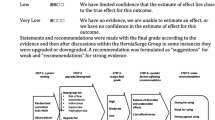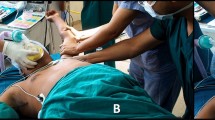Abstract
Purpose
Preliminary data suggest that women with breast cancer are at particularly high risk of adhesive capsulitis of the shoulder. Therefore, this study aimed to investigate the potential association between breast cancer and adhesive capsulitis in adults from Germany.
Methods
This retrospective cohort study included all women aged ≥ 18 years who were diagnosed for the first time with breast cancer in one of 1,274 general practices in Germany between January 2000 and December 2018 (index date). Women without breast cancer were matched (1:1) to those with breast cancer using a propensity score based on age at the index date, index year, and the average number of medical consultations per year during the follow-up. In women without breast cancer, the index date was a randomly selected visit date between 2000 and 2018. The association between breast cancer and the 10-year incidence of adhesive capsulitis was studied using Kaplan–Meier curves and a Cox regression model adjusted for age and several comorbidities.
Results
There were 52,524 women included in this study (mean [SD] age 64.2 [12.9] years). The 10-year incidence of adhesive capsulitis was 3.6% in both the group with and the group without breast cancer (log-rank p-value = 0.317). The Cox regression analysis further showed no significant association between breast cancer and adhesive capsulitis (HR = 0.96, 95% CI = 0.86–1.08).
Conclusion
In this sample of women from Germany, breast cancer was not significantly associated with adhesive capsulitis. Although the present preliminary findings are reassuring, general practitioners should regularly assess shoulder function in breast cancer survivors.


Similar content being viewed by others
Data availability
The data that support the findings of this study are available from the corresponding author upon reasonable request.
References
Ramirez J (2019) Adhesive capsulitis: diagnosis and management. Am Fam Physician 99:297–300
Le HV, Lee SJ, Nazarian A, Rodriguez EK (2017) Adhesive capsulitis of the shoulder: review of pathophysiology and current clinical treatments. Shoulder Elbow 9:75–84. https://doi.org/10.1177/1758573216676786
Manske RC, Prohaska D (2008) Diagnosis and management of adhesive capsulitis. Curr Rev Musculoskelet Med 1:180–189. https://doi.org/10.1007/s12178-008-9031-6
Ding H, Tang Y, Xue Y et al (2014) A report on the prevalence of depression and anxiety in patients with frozen shoulder and their relations to disease status. Psychol Health Med 19:730–737. https://doi.org/10.1080/13548506.2013.873814
Bagheri F, Ebrahimzadeh MH, Moradi A, Bidgoli HF (2016) Factors associated with pain, disability and quality of life in patients suffering from frozen shoulder. Arch Bone Jt Surg 4:243–247
Bouaicha S, Wieser K, Kriechling P, Scholz-Odermatt SM (2020) A large-scale assessment of the healthcare burden of adhesive capsulitis of the shoulder joint. Swiss Med Wkly 150:w20188. https://doi.org/10.4414/smw.2020.20188
Sung H, Ferlay J, Siegel RL et al (2021) Global cancer statistics 2020: GLOBOCAN estimates of incidence and mortality worldwide for 36 cancers in 185 countries. CA Cancer J Clin 71:209–249. https://doi.org/10.3322/caac.21660
Yang S, Park DH, Ahn SH et al (2017) Prevalence and risk factors of adhesive capsulitis of the shoulder after breast cancer treatment. Support Care Cancer 25:1317–1322. https://doi.org/10.1007/s00520-016-3532-4
Wong CJ, Tay MRJ, Aw HZ (2021) Prevalence and risk factors of adhesive capsulitis in Asian breast Cancer patients undergoing an outpatient community Cancer rehabilitation program. Arch Phys Med Rehabil 102:843–848. https://doi.org/10.1016/j.apmr.2020.10.105
Shamley DR, Srinanaganathan R, Weatherall R et al (2007) Changes in shoulder muscle size and activity following treatment for breast cancer. Breast Cancer Res Treat 106:19–27. https://doi.org/10.1007/s10549-006-9466-7
Johansen S, Fosså K, Nesvold IL et al (2014) Arm and shoulder morbidity following surgery and radiotherapy for breast cancer. Acta Oncol 53:521–529. https://doi.org/10.3109/0284186X.2014.880512
Jeong HJ, Sim Y-J, Hwang KH, Kim GC (2011) Causes of shoulder pain in women with breast cancer-related lymphedema: a pilot study. Yonsei Med J 52:661–667. https://doi.org/10.3349/ymj.2011.52.4.661
Pedersen AB, Horváth-Puhó E, Ehrenstein V et al (2017) Frozen shoulder and risk of cancer: a population-based cohort study. Br J Cancer 117:144–147. https://doi.org/10.1038/bjc.2017.146
Cho C-H, Lee K-L, Cho J, Kim D (2020) The incidence and risk factors of frozen shoulder in patients with breast cancer surgery. Breast J 26:825–828. https://doi.org/10.1111/tbj.13610
Kim JH, Kim SH, Kim H-R et al (2020) Ultrasonographic evaluation of chronic shoulder pain after breast cancer surgery: single center, cross-sectional study. Sci Rep 10:16792. https://doi.org/10.1038/s41598-020-73769-8
Hayashi D, Gould E, Shroyer R et al (2021) Shoulder adhesive capsulitis in cancer patients undergoing positron emission tomography - computed tomography and the association with shoulder pain. World J Radiol 13:344–353. https://doi.org/10.4329/wjr.v13.i10.344
Rathmann W, Bongaerts B, Carius H-J et al (2018) Basic characteristics and representativeness of the German Disease Analyzer database. Int J Clin Pharmacol Ther 56:459–466. https://doi.org/10.5414/CP203320
Giani C, Fierabracci P, Bonacci R et al (1996) Relationship between breast cancer and thyroid disease: relevance of autoimmune thyroid disorders in breast malignancy. J Clin Endocrinol Metab 81:990–994. https://doi.org/10.1210/jcem.81.3.8772562
Cohen C, Tortato S, Silva OBS et al (2020) Association between frozen shoulder and thyroid diseases: strengthening the evidences. Rev Bras Ortop (Sao Paulo) 55:483–489. https://doi.org/10.1055/s-0039-3402476
Boyle P, Boniol M, Koechlin A et al (2012) Diabetes and breast cancer risk: a meta-analysis. Br J Cancer 107:1608–1617. https://doi.org/10.1038/bjc.2012.414
Huang Y-P, Fann C-Y, Chiu Y-H et al (2013) Association of diabetes mellitus with the risk of developing adhesive capsulitis of the shoulder: a longitudinal population-based followup study. Arthritis Care Res (Hoboken) 65:1197–1202. https://doi.org/10.1002/acr.21938
Navi BB, Reiner AS, Kamel H et al (2015) Association between incident cancer and subsequent stroke. Ann Neurol 77:291–300. https://doi.org/10.1002/ana.24325
Darby SC, Ewertz M, McGale P et al (2013) Risk of ischemic heart disease in women after radiotherapy for breast cancer. N Engl J Med 368:987–998. https://doi.org/10.1056/NEJMoa1209825
Melton LJ, Hartmann LC, Achenbach SJ et al (2012) Fracture risk in women with breast cancer: a population-based study. J Bone Miner Res 27:1196–1205. https://doi.org/10.1002/jbmr.1556
Tzeng C-Y, Chiang H-Y, Huang C-C et al (2019) The impact of pre-existing shoulder diseases and traumatic injuries of the shoulder on adhesive capsulitis in adult population: a population-based nested case-control study. Medicine (Baltimore) 98:e17204. https://doi.org/10.1097/MD.0000000000017204
Chicco M, Ahmadi AR, Cheng H-T (2021) Systematic review and meta-analysis of complications following mastectomy and prosthetic reconstruction in patients with and without prior breast augmentation. Aesthet Surg J 41:NP763–NP770. https://doi.org/10.1093/asj/sjab028
German Guideline Program in Oncology (German Cancer Society, German Cancer Aid, AWMF) (2021) Interdisciplinary Evidenced-based Practice Guideline for the Early Detection, Diagnosis, Treatment and Follow-up of Breast Cancer. https://www.leitlinienprogramm-onkologie.de/fileadmin/user_upload/S3_Guideline_Breast_Cancer.pdf
National Comprehensive Cancer Network (2020) NCCN Clinical Practice Guidelines in Oncology (NCCN Guidelines ®) Breast Cancer. https://www.nccn.org
Meric F, Buchholz TA, Mirza NQ et al (2002) Long-term complications associated with breast-conservation surgery and radiotherapy. Ann Surg Oncol 9:543–549. https://doi.org/10.1007/BF02573889
De Groef A, Van Kampen M, Dieltjens E et al (2015) Effectiveness of postoperative physical therapy for upper-limb impairments after breast cancer treatment: a systematic review. Arch Phys Med Rehabil 96:1140–1153. https://doi.org/10.1016/j.apmr.2015.01.006
Salam N, Rane S, Das R et al (2013) T cell ageing: effects of age on development, survival & function. Indian J Med Res 138:595–608
Akbar M, Crowe LAN, McLean M et al (2021) Translational targeting of inflammation and fibrosis in frozen shoulder: molecular dissection of the T cell/IL-17A axis. Proc Natl Acad Sci U S A 118:e2102715118. https://doi.org/10.1073/pnas.2102715118
Chuang S-H, Chen Y-P, Huang S-W, Kuo Y-J (2023) Association Between Adhesive Capsulitis and Thyroid Disease: A Meta-Analysis. J Shoulder Elbow Surg S1058–2746(23):00130–00131. https://doi.org/10.1016/j.jse.2023.01.033
Zreik NH, Malik RA, Charalambous CP (2016) Adhesive capsulitis of the shoulder and diabetes: a meta-analysis of prevalence. Muscles Ligaments Tendons J 6:26–34. https://doi.org/10.11138/mltj/2016.6.1.026
Chan JH, Ho BS, Alvi HM et al (2017) The relationship between the incidence of adhesive capsulitis and hemoglobin A1c. J Shoulder Elbow Surg 26:1834–1837. https://doi.org/10.1016/j.jse.2017.03.015
Funding
This research did not receive any specific grant from funding agencies in the public, commercial, or not-for-profit sectors.
Author information
Authors and Affiliations
Contributions
Louis Jacob contributed to the design of the study, managed the literature searches, wrote the first draft of the manuscript, and corrected the manuscript. Ai Koyanagi, Josep Maria Haro, Jae Il Shin, Lee Smith, Niklas Gremke, and Matthias Kalder corrected the manuscript. Karel Kostev contributed to the design of the study, performed the statistical analyses, and corrected the manuscript. All authors contributed to and have approved the final manuscript.
Corresponding author
Ethics declarations
Ethical approval
German law allows the use of anonymous electronic medical records for research purposes under certain conditions. According to this legislation, it is not necessary to obtain informed consent from patients or approval from a medical ethics committee for this type of observational study that contains no directly identifiable data.
Competing interests
The authors have no relevant financial or non-financial interests to disclose.
Additional information
Publisher's note
Springer Nature remains neutral with regard to jurisdictional claims in published maps and institutional affiliations.
Rights and permissions
Springer Nature or its licensor (e.g. a society or other partner) holds exclusive rights to this article under a publishing agreement with the author(s) or other rightsholder(s); author self-archiving of the accepted manuscript version of this article is solely governed by the terms of such publishing agreement and applicable law.
About this article
Cite this article
Jacob, L., Koyanagi, A., Haro, J.M. et al. Is there an association between breast cancer and incident adhesive capsulitis of the shoulder? A retrospective cohort study from Germany. Support Care Cancer 31, 347 (2023). https://doi.org/10.1007/s00520-023-07808-1
Received:
Accepted:
Published:
DOI: https://doi.org/10.1007/s00520-023-07808-1




